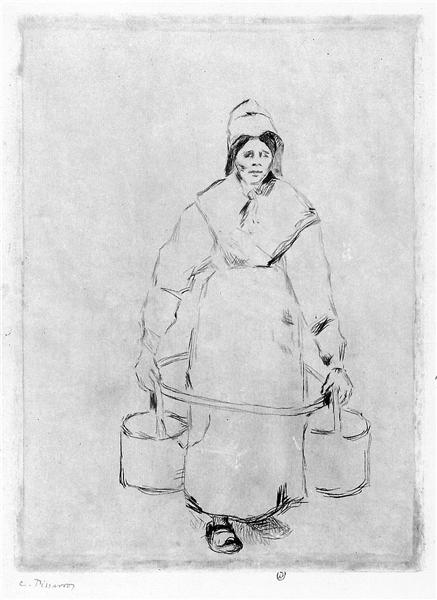Description
The work "Peasant Woman in the well" of Camille Pissarro is a fascinating testimony of the artist's approach towards the representation of rural life and the daily world. Painted in 1881, during one of the most fruitful phases of her career in the framework of impressionism, the work captures a delicate moment in the life of a peasant woman who, with air of tranquility and determination, is close to a well. This painting is not only an outstanding example of the technical ability of Pissarro, but also reflects its nutritious ideals about rural life and the simplicity of everyday life that are often ignored by modern society.
In this work, the composition is carefully located in an open and somewhat illuminated space. The figure of the woman, dressed modestly, is almost focused on the canvas, giving a sense of importance and dignity to the character. She stands out between a natural environment that, despite being present, does not compete with her for the viewer's attention. The position of the woman, slightly hunched over while clinging to a bucket, suggests not only a moment of activity, but also the symbolic burden of rural work and the reality of life in the countryside. His face, although directly visible, has a serene expression that invites introspection about its existence.
The use of color in the work is particularly remarkable. Pissarro uses a palette of terrible and soft tones that complement each other with nuances of green and blue, creating a harmonic environment that reflects the calm of the rural environment. The light, which seems to be filtered through vegetation, results in a luminosity effect that surrounds the figure of the peasant. Loose and expressive brushstrokes capture the dynamism of the landscape, providing textures that evoke living and impetuous nature. This technique is aligned with the spirit of impressionism, where the approach is less about detailed precision and more about the atmosphere and the emotion of the moment.
The choice to represent a farmer is also significant within the historical context. During the nineteenth century, the representation of peasant life was a booming theme in art, reflecting both a romantic ideal of rural life and a criticism of industrialization. Through his work, Pissarro stands as a defender of work values and connection with the Earth, aligning with an idealistic vision that contrasts with the excessive urban growth of his time.
In sum, "peasant woman in the well" is not only a visual representation of a woman in her everyday environment, but is a celebration of the spirit of rural work and simple life. The painting is well within the work of Pissarro, who through its explication of impressionism echoed the lives of those whose stories often remained in the shadow. It is a reminder of the value of dignity and beauty in everyday life, a legacy that continues to resonate in contemporary art. The work is erected as a enduring symbol of the human connection with the nature and recognition of those who, through their work, maintain the fabric of rural life.
KUADROS ©, a famous paint on your wall.
Hand-made oil painting reproductions, with the quality of professional artists and the distinctive seal of KUADROS ©.
Reproduction service paintings With a guarantee of satisfaction. If you are not completely satisfied with the replica of your painting, we refund your money 100%.

